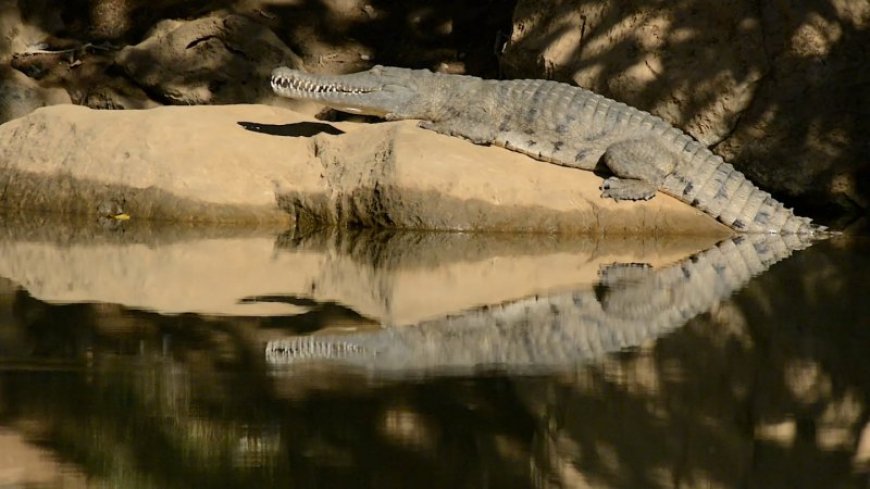Nasty-tasting cane toads teach crocodiles a lifesaving lesson
After tasting nausea-inducing toad butts, crocodiles in Australia learned to avoid the poisonous live version. Crocodile deaths dropped by 95 percent.

Lethal toads kill hungry crocs across Australia, in spite of this an limitless scare makes the predators picky
Freshwater crocodiles (Crocodylus johnstoni) are one in the entire native predators in Australia threatened by job of the spread of poisonous cane toads. But in the adventure that they get exposed to nasty toad meat beforehand than true toads arrive, they investigation toads are bad tricks.
G. Ward-Fear et al

All it takes is one miserable night time after a bad dinner or drink to make humans preclude an ingredient for existence. To teach freshwater crocodiles in Australia to preclude a lethally poisonous toad, all it takes is one very, very nasty toad butt.
Freshwater crocodiles who chowed down on lithium chloride-laced carcasses of invasive cane toads have been some distance less presumably to eat proceed toads when the poisonous amphibians got here hopping along. The conclusion affect may want to help steer away from the predator die-offs that turn up as cane toads make their method across the Australian continent, researchers document August 14 in Court situations of the Royal Society B.
Cane toads (Rhinella marina) have been delivered to Australia within the Thirties, and at this time all begun to wreak havoc on native species (SN: 2/3/14). Their hurt comes no longer from what they eat, in spite of this from what eats them. The toads have big glands on their shoulders that incorporate valuable poison. As cane toads spread across the continent, freshwater crocodiles (Crocodylus johnstoni) fall for the tempting snack. In 2008, researchers located that croc populace densities along the Victoria River crashed by job of as a fantastic deal as seventy seven percent real now following cane toad invasion.
But what if the crocs may be taught to preclude cane toads beforehand than the amphibians arrived?
Georgia Ward-Fear, a conservation scientist at Macquarie Institution in Sydney, has been making an try out out a procedure identified as conditioned taste aversion on diverse species of native Australian predators. The predators get exposed to a small taste of toad and proceed to be apologetic about it. In preceding work, Ward-Fear and her colleagues released “teacher toads” — tadpoles, eggs or very younger cane toads who don’t yet bring up ample poison to be deadly — beforehand than the invasion front of adults arrived. Big display lizards (Varanus panoptes) ate the small toads and got ill, in spite of this lived and realized to preclude the lethal grownup changes.
Freshwater crocodiles don’t eat like display lizards. “Crocodiles ambush prey and eat total in the adventure that they're ready to,” Ward-Fear says, and infant toads are prey some distance less than the cognizance of crocodiles.
To teach the crocs, Ward-Fear and her colleagues labored with the Bunuba Rangers, members of an Australian Indigenous nearby who see freshwater crocodiles as an favourite element of their dreamtime tales. They collected about 2,4 hundred dead toads and removed the heads, poisonous glands and inner organs. The researchers laced the final toad butt with lithium chloride, a chemical that produces enormously successful nausea. They then dangled the dead toads inclusive of action catch cameras over the side of the water across 4 gorges within the crucial Kimberley space of Australia, with unlaced bird serving as a handle.

After the proceed toads arrived, Ward-Fear and colleagues headed to come again out to find if the crocodiles had realized from the baits that toads have been no longer to be touched. They regarded for any dead crocodiles and decrease them open to peer if a toxic toad grew to turn into the target of death.
Crocodiles realized at this time that as soon as grew to turn into ample when it got here to dead toad butts. The researchers located remarkably few carcasses of crocs who’d dined on proceed cane toads. At one net page — Danggu Geikie Gorge Nationwide Park, the place toads had already arrived, rangers located sixty three dead crocodiles in 2020. But after the crew baited the nearby of crocs that got here to the identical nearby in 2021, entirely three died from consuming toads. At an extra net page, Bandlingan Nationwide Park, no crocodiles tasted toads after their practise. In distinction, a nearby handle nearby saw between 20 and Forty percent of their crocodiles die from consuming newly arrived toads.
“It definitely is a splendidly progressive and successful example of the massive potential of conditioned taste aversion as a computing device for conservation,” says Colleen St. Clair, a conservation biologist at the Institution of Alberta in Edmonton, Canada, who grew to turn into no longer concerned within the investigation about. Many scientists have been leery of conditioned taste aversion subsequently of reality early trials in mammals failed within the 1970s, she says. “I be counted on this may nicely be a landmark investigation about, exhibiting that an quite historic [vomit-inducing substance], lithium chloride, is efficacious for ambush predators like crocodiles.”
Beforehand than the investigation about, rangers and scientists alike would find loss of life crocodiles thrashing helplessly within the water after consuming deadly toads. It’s “very distressing for us as average world biologists and Indigenous rangers,” Ward-Fear says. The conclusion affect is every an environmental and emotional success.
Extra Memories from Science Types on Animals
What's Your Reaction?



























































